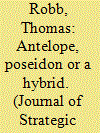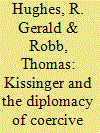|
|
|
Sort Order |
|
|
|
Items / Page
|
|
|
|
|
|
|
| Srl | Item |
| 1 |
ID:
100668


|
|
|
|
|
| Publication |
2010.
|
| Summary/Abstract |
It is the purpose of this article to illustrate how the British government reached its decision to upgrade the Polaris strategic nuclear deterrent in 1973. Using British and American documentation it is demonstrated that the strategic imperatives for upgrading Polaris were fundamental to the project. Existing accounts of the Polaris Improvement Project, however, have not given the appropriate attention to the wider US-UK political differences in this period. By doing so it is shown how in addition to the wider economic, strategic and political factors, this was of paramount significance in the Heath government opting for the 'Super Antelope' method in upgrading Polaris.
|
|
|
|
|
|
|
|
|
|
|
|
|
|
|
|
| 2 |
ID:
131454


|
|
|
|
|
| Publication |
2013.
|
| Summary/Abstract |
The majority of scholarly accounts suggest that Anglo-Americans throughout the era of détente, 1969-1977, were often fraught with difficulties. In particular, the relationship between the Nixon administration and the British government of Edward Heath is often seen as the nadir for the Anglo-American relationship during the Cold War. Nonetheless, elements of the Anglo-American "special relationship," particularly those related to intelligence and nuclear co-operation, are often seen by scholars to have operated outside of these wider political difficulties. By utilising recently declassified documentation from both U.S. and UK archives, it is shown that both intelligence and nuclear co-operation were continually used by the United States as a means of convincing London to follow more amenable policy lines. With Henry Kissinger very much to the fore, it is illustrated how this coercive diplomacy had mixed results in achieving what Washington desired. Ultimately, this policy line would not accomplish what its main adherent, Henry Kissinger, sought.
|
|
|
|
|
|
|
|
|
|
|
|
|
|
|
|
| 3 |
ID:
105227


|
|
|
|
|
| Publication |
2011.
|
| Summary/Abstract |
This article focuses upon the British defence cuts undertaken during the final governments of Harold Wilson, 1974-1976, within the broader context of the Anglo-American "special relationship." Utilising previously classified material, it shows how the United States attempted to negate the severity of Britain's defence cuts. Such efforts were largely futile in preventing such reductions. Moreover, Anglo-American co-operation in a number of highly sensitive areas remained largely unaffected. Rather, the consequence for Anglo-American relations was for Britain to lose political standing in the opinion of the Nixon-Ford administrations. In the short term, this process was to have little discernable impact. Rather the repercussions of this became clear once Wilson had left office, most notably during the International Monetary Fund Crisis of 1976.
|
|
|
|
|
|
|
|
|
|
|
|
|
|
|
|
|
|
|
|
|